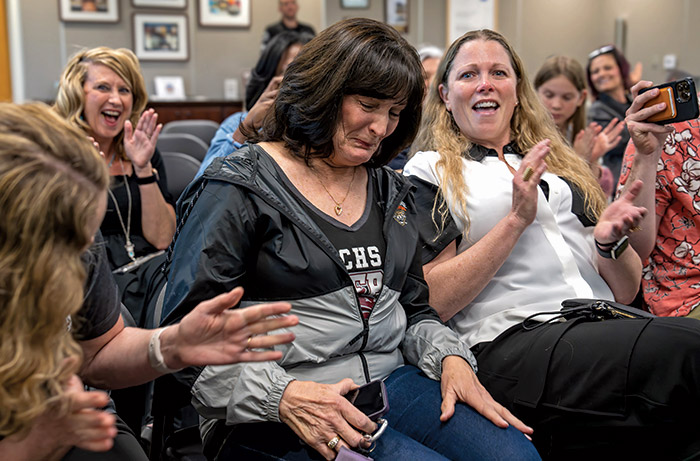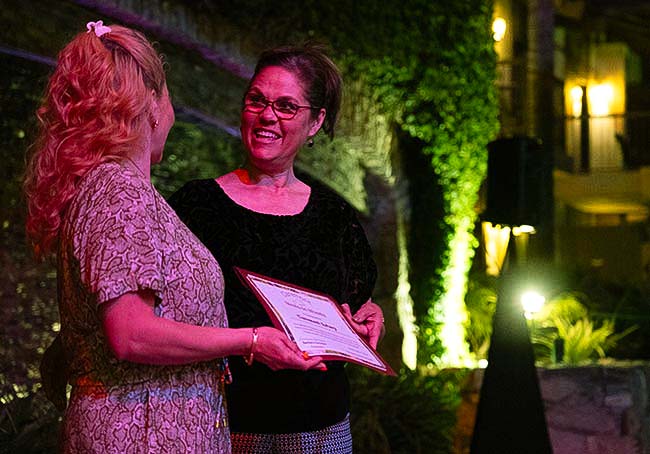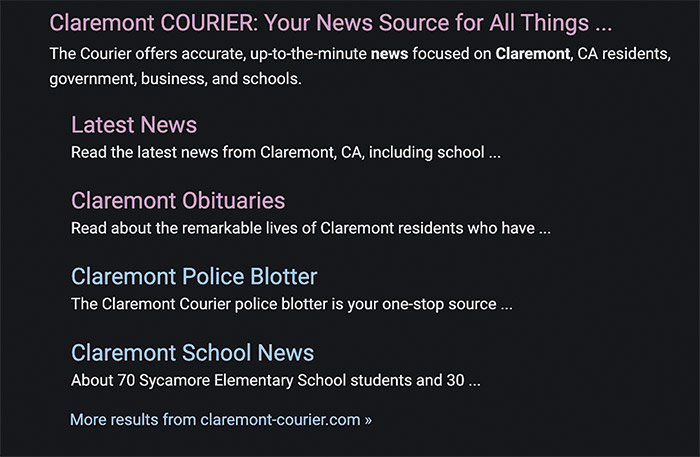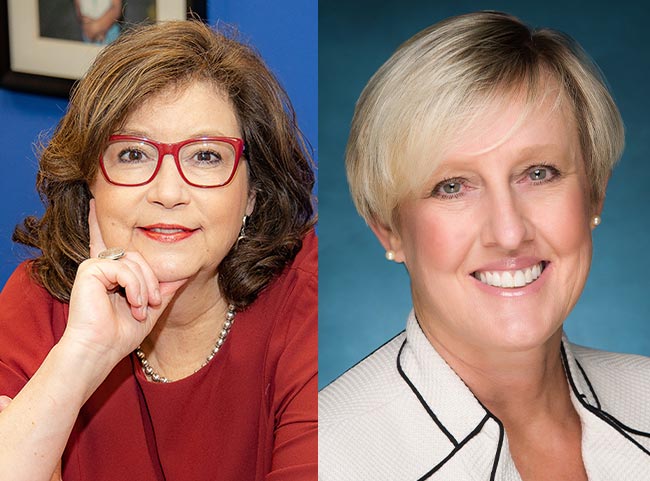Creating a game plan:
Finding that first job after graduation
It’s off to the future for seniors at The Claremont Colleges preparing to graduate this weekend. When they see friends and relatives at commencement festivities, they will likely hear the question all graduates face. “What’s next?”
Some undergrads plan to go on to graduate or professional school, while others will take advantage of the increasing amount of “gap year” opportunities that extend past travel, sunbathing and reflection. These include a growing number of national and international programs allowing students to see the world or touch some lives while adding meaningful experience to their resume.
Many new Claremont Colleges alumni have already secured employment, often with the help of their respective colleges’ career centers, whose staffs work vigorously to help students find a post-graduate niche.
Others are still seeking employment.
Creating a ripple effect
There are signs that Americans’ employment opportunities are on the rise. U. companies posted more than 3.7 million job openings in March, the highest in nearly 4 years, according to a Tuesday, May 8 press release from the Bureau of Labor Statistics (BLS).
And yet, the country is a long way from the 8.8 million jobs on offer in the days predating the economic crisis. The unemployment rate is hovering at 8 percent or some 12 million people.
Representatives from colleges like Scripps, Pomona and Claremont McKenna (CMC) and the Claremont Graduate University (CGU) say student employment prospects have improved since a consortium-wide dip that saw job offers at their lowest ebb in 2009.
“At least on our campus, there’s been more activity among employers. They’re still contacting us, still posting jobs and asking about candidates, even though the students are about to graduate,” said Young Kwak, associate dean of students and director of career services at Claremont McKenna College.
The career center staff at CGU, Scripps and Pomona Colleges also report increased employer interest. In fact, Harvey Mudd reports the number of their graduates emerging with degree or experience in software engineering is not enough to meet employer demand.
Despite these happy phenomena, job-seeking students face a challenge, particularly if their goal is to land a spot in a recession-ravaged field like education.
It’s a ripple effect, Mr. Hardister said.
“Sometimes people have a feeling of ‘Wow, there’s all these job postings. Why can’t you get a job?’ You don’t know what the competition is for these jobs,” he said. “Even though there’s an uptick in what employers are offering, because of the number of people across the country that have been displaced, they’re competing with more candidates.”
Old techniques, new technology
For the Scripps College Career Planning and Resource staff, stepped-up placement efforts have involved embracing the digital age.
Each year, Scripps, like many colleges, creates a resume book, allowing employers to browse through the qualifications of their job-seeking graduates. Many schools’ books are now presented as PDF files, making them computer-viewable.
Scripps has taken a new step this year in presenting its resume book as a digital publication that viewers can flip through like a book. The book includes links that allow prospective employers to zero in on students hoping to work in their fields and who are willing to work in their geographic regions.
“We have incredibly bright and talented young women who are graduating into a very tight and highly competitive economy. We have turned to new technology and platforms to connect our accomplished undergraduates with employers and career networks,” said Vickie Klopsch, Scripps College’s director of CP&R in a recent release.
This year’s Scripps resume book showcases a “small but mighty” pool of 60 job-seeking students in an innovative manner. It was sent to more than 1300 employers, the Scripps College alumnae community and to select members of the Scripps Association of Families.
It’s been tough, said Barbara “Bonnie” Yelverton, who, at 69, is graduating with a master of art’s degree in education from Claremont Graduate University.
Ms. Yelverton, whose areas of expertise are science and math, had a hard time obtaining the teaching position she needed to rack up hours for her credential. Now that she is graduating, she is having trouble finding a steady teaching gig.
A job would provide more than income. It would provide relief from Ms. Yelverton’s $50,000 student loan debt. After 5 years of teaching, an education student’s debt is excused.
Ms. Yelverton (an Upland resident who most recently applied for work in the Hesperia school district) says age may have something to do with her lack of application traction, because most of her younger peers have found a place.
Still, she is aware that many students face her plight.
“It’s really unfortunate because there’s some really great teachers among these people,” she said.
As she prepares to leave Scripps College, graduating senior Michelle No isn’t sure what she’s going to do, but she knows exactly what she wants to do.
Ms. No, who double majored in Italian and European studies with a concentration in modern visual culture, wants to go into publishing. Her top choices would be a staff position at a Conde Naste or Hearst publication.
The headquarters of the kinds of magazines she would like to work for, and the vast amount of publishing opportunities Ms. No has seen, are located in New York.
With this in mind, Ms. No plans to move to New York by August. She is just now beginning a thorough focus on job searching, because she was absorbed this last year by work on her thesis and on “living my life.”
Ms. No is confident that she will be able to find a job, most likely through alumni connections or other networking endeavors. Adding to her assurance, she’s managed to create a strong resume, with which the Career Planning and Resources staff have helped her immensely.
While she was at Scripps, the CP&R staff helped her procure 2 internships that provided her with invaluable publishing experience, one with a small start-up LA-based progressive culture publication called Good Magazine and another with the same city’s longstanding alternative culture magazine, the LA Weekly.
Ms. No is now ready to go forward in her career search, armed with job-seeking knowledge and on-the-job chops cultivated during her internships.
“I feel like I’m competent. I have a great resume, I just need to apply myself,” she said.
Ms. Yelverton said she didn’t anticipate that finding a job would be so difficult.
“Everybody was saying, ‘Oh, they need science teachers. They need math teachers. If you study, you’ll get a job immediately, and they meant it,” she said. “The world’s a completely different place than it was.”
Despite the current standstill, Ms. Yelverton is passionate about education and its opportunity to change troubled students’ lives, and is proud to be walking this weekend at the CGU commencement.
“I’m quite pleased that, at 69, I haven’t given up. I’m not just sitting around reading books and watching TV and waiting for the world to go by,” she said. “I’m out there helping kids get on in life.”
Mr. Hardison urges Ms. Yelverton, or any other CGU students and alumni, not to give up and use the career center to take advantage of the resources.
He also gives his students, and anyone seeking work, recent grad or otherwise, to follow some career-building tips.
1. Vet your social networking profiles.
We all have enough sense to “keep it clean” on our social networking profiles while we are seeking work. We’ve heard stories of people who have missed out on job opportunities because of social networking fouls like posting a slew of hard-partying Facebook pictures.
Mr. Hardison takes this a step further, urging jobseekers to “keep it private.” Many people, understandably, post proud pictures and posts detailing the development of their family. Unfortunately, he warns, even something this sweet can backfire. If you are seen posing with your 4 children, fair or not, a potential employee might conclude you have too many responsibilities. You might not get the call, simply because a prospect envisions you taking too many sick days.
Another thing a jobseeker might want to keep private is his or her age. Many people go to great pains to hide their age on job resumes, but leave it posted for all to see on their Facebook page. It only takes a moment’s online sleuthing for an employer to discover something else that, unfortunately, is often held against those in the job market.
2. Network, network, network.
At the Claremont Colleges, the career center staffs emphasize networking, urging students to reach out to alums who are working in their fields of interest. Well-placed former classmates are excellent sources of employment opportunities and information.
Mr. Hardister advises jobseekers of every ilk to step up their networking, starting with something as easy as Facebook. Most of us have classmates and relatives and former co-workers who, given the chance, would put in a good word for us. We may not realize, however, that an acquaintance has changed jobs. With this in mind, he suggests an app available on Facebook called Career Friend, which culls and lists where all of your Facebook friends are working.
“I would almost say that it’s kind of the old adage, ‘What’s old is new again’ in the sense that networking has become more important than ever before,” said Mr. Hardister.
3. Seek career counseling.
Whether you are a student looking to start your career or a frustrated jobseeker, Mr. Hardister stresses the importance of career counseling.
Whether you use your alma mater’s career center, join a nonprofit organization dedicated to helping jobseekers such as the Pasadena-based Women At Work or hire a professional, it’s important to get with someone who can help you pursue every avenue in every effective way.
“I think that the students who perform better in the job market or fare better are ones that develop an ongoing rapport with one of the career coaches at their career center,” he said.
For career planning professionals like Mr. Hardison, helping people fare better is the name of the game.
“We really get to know the student and/or graduate and come up with an action plan,” he said. “We like to give them at least a couple of action items so they can come back and say, ‘Hey, this worked for me. I got stumped here. What else can we try?’”
—Sarah Torribio
storribio@claremont-courier.com









0 Comments